
In 2020, Lalita Boipai, a rural healthcare worker, was conducting tests with malaria kits in her village, Bera Kundrijor, as part of a government survey. She, however, was not prepared for its findings. “Surprised at the zero cases of malaria in my report, I got nervous thinking it would raise questions from the higher authorities,” she told me. “Out of panic, I reported two-three fake cases.”
Bera Kundrijor is one of the 62 villages in the Noamundi block of West Singhbhum district in Jharkhand. The district is highly vulnerable to a malaria endemic. According to the National Vector Borne Disease Control Program, Jharkhand reported 37,133 malaria cases in 2019—in which West Singhbhum alone reported 9,077 cases, the highest in the state. In 2020, the cases in Jharkhand came down to 16,655.
Astounded by the zero malaria cases, Boipai ascribed it to the “malaria kadha” drive in her village. Malaria kadha is a syrup made from locally available forest-based herbs to provide immunity against mosquito bites. Adivasi women groups prepare this kadha at the beginning of each monsoon season, which gets distributed among the villagers—the prescribed dose is half-a-glass for three days on an empty stomach. The kadha has become increasingly popular in the area.
Boipai testified to this success with her personal experience. “Earlier, each month, one of my children would fall sick of malaria. I had spent a lot of money after them,” she told me. “Since I started taking malaria kadha as a preventive medicine against the disease, my family has been free from malaria.”
This story is from the July 2022 edition of The Caravan.
Start your 7-day Magzter GOLD free trial to access thousands of curated premium stories, and 9,000+ magazines and newspapers.
Already a subscriber ? Sign In
This story is from the July 2022 edition of The Caravan.
Start your 7-day Magzter GOLD free trial to access thousands of curated premium stories, and 9,000+ magazines and newspapers.
Already a subscriber? Sign In

HOW TO SEE ART?
BN Goswamy's strategies of seeing
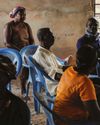
Bitter Crop
Ghana's cacao plantations in crisis
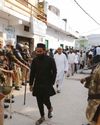
SURVEYORS OF DESTRUCTION
An atmosphere of fear persists in the wake of the Sambhal violence
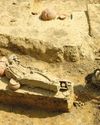
SITE OF DECEIT
HOW THE ASI FORTIFIES HINDUTVA HISTORY
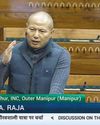
The Broken Pact
Minority legislators rue the erosion of the Constitution under the Modi government/
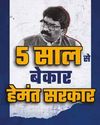
Hate by Proxy
How shadow accounts on Meta spread BJP propaganda in Jharkhand

Mob Mentality
How the Modi government fuels a dangerous vigilantism

RIP TIDES
Shahidul Alam’s exploration of Bangladeshi photography and activism

Trickle-down Effect
Nepal–India tensions have advanced from the diplomatic level to the public sphere

Editor's Pick
ON 23 SEPTEMBER 1950, the diplomat Ralph Bunche, seen here addressing the 1965 Selma to Montgomery March, was awarded the Nobel Peace Prize. The first black Nobel laureate, Bunche was awarded the prize for his efforts in ending the 1948 Arab–Israeli War.